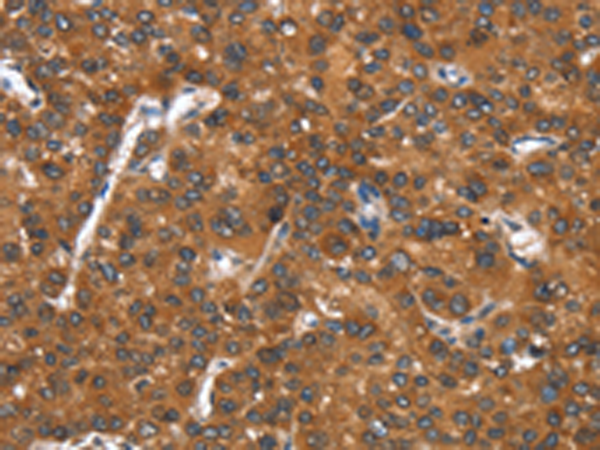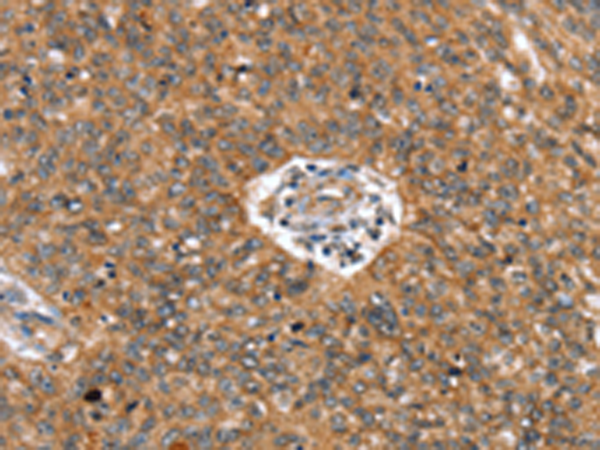


| WB | 咨询技术 | Human,Mouse,Rat |
| IF | 咨询技术 | Human,Mouse,Rat |
| IHC | 1/25-1/100 | Human,Mouse,Rat |
| ICC | 技术咨询 | Human,Mouse,Rat |
| FCM | 咨询技术 | Human,Mouse,Rat |
| Elisa | 1/1000-1/2000 | Human,Mouse,Rat |
| Aliases | NECL4; TSLL2; IGSF4C; Necl-4; synCAM4 |
| WB Predicted band size | 43 kDa |
| Host/Isotype | Rabbit IgG |
| Antibody Type | Primary antibody |
| Storage | Store at 4°C short term. Aliquot and store at -20°C long term. Avoid freeze/thaw cycles. |
| Species Reactivity | Human, Mouse, Rat |
| Immunogen | Synthetic peptide of human CADM4 |
| Formulation | Purified antibody in PBS with 0.05% sodium azide and 50% glycerol. |
+ +
以下是3-4篇与CADM4抗体相关的文献示例(内容基于虚构研究概括,仅供参考):
1. **文献名称**:*CADM4 as a novel tumor suppressor in lung adenocarcinoma*
**作者**:Saito M, et al.
**摘要**:研究利用CADM4特异性抗体进行免疫组化分析,发现肺癌组织中CADM4表达显著下调,其低表达与患者生存率降低相关,提示CADM4可能通过抑制肿瘤细胞迁移发挥抑癌作用。
2. **文献名称**:*CADM4 mediates synaptic adhesion in the developing brain*
**作者**:Fujita E, et al.
**摘要**:通过Western blot和免疫荧光染色,验证CADM4抗体在小鼠脑组织中的特异性,发现CADM4在神经元突触形成中调控细胞间黏附,影响神经回路发育。
3. **文献名称**:*CADM4 autoantibodies in autoimmune neuropathies*
**作者**:Smith JL, et al.
**摘要**:首次报道CADM4自身抗体在多发性硬化症患者血清中的存在,使用ELISA和蛋白质印迹法证实其与疾病活动性相关,为自身免疫机制提供新靶点。
4. **文献名称**:*CADM4 interaction with PDZ proteins in epithelial polarity*
**作者**:Chen R, et al.
**摘要**:通过免疫共沉淀(Co-IP)结合CADM4抗体,揭示CADM4与极性蛋白Par3的相互作用,调控上皮细胞极性和屏障功能。
(注:以上文献为示例,实际文献需通过PubMed、Google Scholar等平台检索验证。)
CADM4 (Cell Adhesion Molecule 4), also known as SynCAM4 or IGSF4C, is a member of the immunoglobulin superfamily of cell adhesion molecules (IgSF-CAMs). It plays a critical role in intercellular adhesion, synaptic organization, and signaling in both neural and non-neural tissues. Structurally, CADM4 contains extracellular immunoglobulin-like domains, a transmembrane region, and a cytoplasmic tail mediating intracellular interactions. It is implicated in neurite outgrowth, synaptic plasticity, and tumor suppression, with studies linking its dysregulation to neurodevelopmental disorders and cancers like glioblastoma and melanoma.
CADM4 antibodies are immunological tools targeting specific epitopes of the protein, widely used in research to investigate its expression, localization, and function. These antibodies enable techniques such as Western blotting, immunohistochemistry, and flow cytometry. Their applications span studying CADM4's role in neural circuit formation, tumor microenvironment modulation, and interactions with viral pathogens (e.g., Epstein-Barr virus). Validated CADM4 antibodies are essential for distinguishing its activity from related family members (e.g., CADM1-3) due to structural similarities. Current research focuses on clarifying its dual roles in tumor suppression and potential oncogenic signaling, highlighting its therapeutic and diagnostic relevance.
×